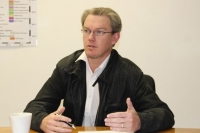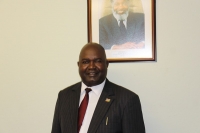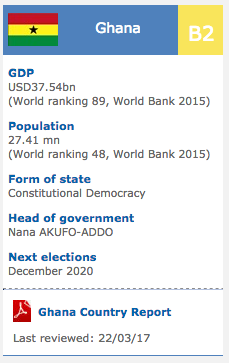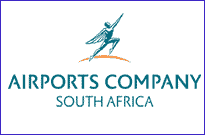Namibia: Namibia Minister Calle Schlettwein
2014/12/25

Calle Schlettwein served in a succession of government ministries as permanent secretary - the top civil servant post - since Namibia became independent in 1990. For most of the previous decade, he was an anti-apartheid activist and member of the independence movement Swapo, which has won by overwhelming margins in each of the elections in the succeeding 24 years. In 2010, Schlettwein was appointed to Parliament by President Hifikepunye Lucas Pohamba, who made him deputy finance minister and, in 2012, named him Minister of Trade and Industry.
In an interview during a visit to New York, Schlettwein explained the increase policies being pursued by his government as it steers a country with a people of 2.3 million and an economy dwarfed by South Africa next door. Excerpts:
To start with a bit of background, you joined Swapo at a young age - not a particularly popular move in your German community, I assume - and you trained as a scientist.
Yes, I joined SWAPO in the early 1980s as a very young person. Things were still very much under apartheid. The war was raging. My siding with the enemy was not appreciated by my compatriots. That happened in a lot of other families too. It happened with a lot of of us. I at no time regretted it. The good fight has proven to be a really good fight, and we're doing well. I'm a trained ecologist. I worked with insects. My field of work was originally pest control. From there I moved into the environmental issues, environmental impact assessments of large water infrastructures. At the same time as independence came, I was really fortunate to be appointed as the initial Permanent Secretary of the Ministry of Agriculture, Water, Fisheries and Rural Development. From there I moved through a number of ministries as permanent secretary and for the last ten years in finance as a permanent secretary. From there I was promoted into parliament by President Pohamba as deputy minister for Finance and again appointed Minister of Trade and Industry.
Turning to your Ministerial duties, how does Namibia as a small country and small producer manage to gain access to the markets you need for exports?
Namibia has been completely successful in getting market access. The Southern African Customs Union (SACU), provides complete access to the five members - South Africa, Botswana, Swaziland and Lesotho, along with Namibia - and capital flows are free. In the 14 member states of SADC (Southern African Development Community), 90 % of tariffs are zero %, and we have quota-free tariff-free movement of goods. We have a European partnership arrangement with which we will have quota-free, tariff-free access to the EU market. We have a preferential trade agreement with non-EU member European nations - Norway, Switzerland, Luxembourg, Iceland. Market access there is not a problem. We have negotiated a PTA [Preferred Trade Agreement] in Latin America. That's Brazil, Argentina, Paraguay which needs to be ratified, so we don't have market access there from presently on.
Market access is an area where we've been completely successful, but there's a downside to it. There's a downside that the developing world must consider and that is the policy side for industrialization. We don't have the opportunities that East Asia had to develop under strict protective legislation. We still face unfair competition where agricultural competition from the EU comes into our markets on an uneven playing field. They don't call them subsidies, but there are huge support measures put in place. We have to counter with low subsidies. That is a large downside for industrialization in a globalized free trade arrangement.
Can you explain how the free market ethos affects you and how Namibia is industrializing?
The free market arrangement only benefits those with finished goods to trade with. If you don't have the opportunity to industrialize, you have no finished goods to trade with. You can only trade primary goods, raw materials. There, free market access only helps you inasmuch as commodity pricing structure does. It is not in your hands. It is in the hands of the developed world. Free trade is good if you have production capacity and you are industrialized. If you are not industrialized, free trade makes your process to industrialize much additional difficult.
That is what we are struggling with. We think regional integration is an significant element to fix that. We need to develop regional price chains that enable Namibia to move up the world price chain. We are sitting at the bottom of that price chain for presently. We must move up with production of intermediaries or finished goods. We can do that better jointly. We need to utilize production capacity that is maybe in Namibia or in Botswana or in an extra SADC country. Through that joint effort, we think our prospects are better. Second, we believe that inter-African trade is crucial to develop our industries. We have logistic barriers to overcome. It is cheaper and faster to move a container from China to Dar es Salaam than from Walvis Bay to Dar es Salaam. We must improve our infrastructure that enables us to move goods. We must as well streamline our bureaucracies, our procedures and regulatory framework that enables us to trade with neighbors better than through third parties.
How do the economic effects of Ebola in west Africa trickle down, and how are you handling that?
We have adopted an emphatic Africa Union position around Ebola. It basically says that we will keep our borders open while ensuring that we create preventative measures with our healthcare system to ensure that we can transaction with the introduction of an outbreak. It makes it worse if you close borders where the causes are not justified. Ebola is 6000 km from Namibia. There are no links with any other neighboring states, so there is no need to close our borders or get paranoid.
There were Brazilian delegations that were cancelled and there was a delegation from Hong Kong that was cancelled; in spite of us explaining all of the precautionary measures we have taken, the distance between us and where the outbreak is, and the small level of risk they would be taking. I think there is an unfortunate perception that Africa is one large black hole, and that whatever happens anywhere in Africa is relevant everywhere in Africa. That is not the case. Africa is a very diverse place and a large continent. That is something we need to propagate and educate the world additional on - Africa's abilities and strengths [and] that we have institutional abilities and strengths to transaction with problems like Ebola.
What are you doing to create jobs and attract investment ?
We want to improve the basic infrastructure that makes Namibia a stable and preferred investor's home. Infrastructure serves the people, and it serves the larger SADC area. Our market is small. As we expand the market size, problems are solved by integrating regionally.
A decision to invest rests on a number of criteria. We try to focus on those that matter most. We want to be the majority competitive investor's home in southern Africa and maybe in the continent. Right presently we are probably eighth or fifth, depending on what rating statement you are looking at, so we are doing fine, but we could be doing better.
We are investing in transport infrastructure that makes us preferred. We invest heavily in education research and development. Nearly a quarter of our budget goes into that sector. We have focused on those economic sectors that have the best prospects for increase - mining, manufacturing as a sector where we want to develop price chains based on our raw material endowment, inclunding transport infrastructure and tourism. Those are the sectors that we believe have the highest level of increase potential. We want to focus into those sectors and drive the economy from there. Agriculture is a sector where we have potential. In spite of being very dry, there is opportunity to improve production of agricultural products and as well processing of those raw materials. And fishing, of course. Our large coastline and a nutrient-rich upwelling system gives us prospects on fishing.
What about the human capacity gap?
There is a gap there. As I said, our education budget since independence has been between 23 and 25 %. We have increased our enrollment [to where] we have 98 % in school. Our literacy went up to 80 %. We are doing good things in education, but there are signs that those large investments in the education system do not yield the necessary returns. There is waste in the system, and there is a discrepancy between what the market needs and what the system delivers. We are reviewing that and tweaking the education system so that vocational training becomes additional significant, and technical training becomes additional significant. We are developing an immigration policy that allows for the import of technical expertise so that investors have the assurance that their knowledge and expertise can come along and be utilized.
Do you feel like you're getting the word out to investors?
Namibia is a bit of a unsung success story. To improve that is one of my jobs. We want to promote Namibia as an investors home and a reliable trading partner, as a stable economy, as a growing economy. I hope to get there and your job makes part of that happen. It doesn't come for free. We must promote ourselves. We must show, by doing. Successful investments are the best promotion tools for new investors approaching.
- Related Articles

Africa's Relationship With China Is Ancient History
2017/07/02 In 2002 South Africa's Parliament unveiled a digital reproduction of a map - of China, the Middle East and Africa - that some speculated could be the initial map of the African continent. The Da Ming Hun Yi Tu - the Comprehensive Map of the Great Ming Empire - was drawn up around 1389 during the Ming Dynasty, according to historian Hyunhee Park.
Africa: Making Things Happen at the Bank - 'Not a Talk Shop' - Akin Adesina
2017/07/02 Dr. Akinwumi Adesina is focusing on five areas to achieve the African and world goals for a prosperous continent since becoming president of the African Development Bank - Africa's major public financial institution in September 2015. He was a keynote speaker at this month's Corporate Council on Africa's U.S.- Africa Business Summit in Washington D.C. and moderated a lively panel with five African government ministers. He as well received the Gene White Lifetime Succcess Award from the World Child Nutrition Foundation. This week, he was named the 2017 recipient of the World Food Prize, a prestigious honor that includes a $250,000 award. In an interview in Washington, DC, Adesina discussed the Development Bank's ambitious schedule and his vision for attracting the increase capital Africa needs. Posting questions for AllAfrica was Noluthando Crockett-Ntonga.
Climate change laws around the world
2017/05/14 There has been a 20-fold increase in the number of global climate change laws since 1997, according to the most comprehensive database of relevant policy and legislation. The database, produced by the Grantham Research Institute on Climate Change and the Environment and the Sabin Center on Climate Change Law, includes more than 1,200 relevant policies across 164 countries, which account for 95% of global greenhouse gas emissions.
Tiaan Bazuin, CEO of the Namibian Stock Exchange
2015/12/03 Tiaan Bazuin, CEO of the Namibian Stock Exchange, sits down with Globus Vision to outline Namibia’s current economic dynamics, and the challenges of the Stock Exchange. Where will you be placing your focus regarding policies and specific initiatives moving forward? Even prior to the election we by presently had something called the Namibian Financial Sector Strategy where the NSX has a very specific role in trying to deepen and diversify the market.
Penda Ya Ndakolo, Minister of Defense Namibia
2015/09/18 We sit with Penda Ya Ndakolo, Namibia’s Minister of Defense, and discuss the importance of 25 years of independence and the role of the defense force in providing peace and stability. He offers his perspective on further regional integration and the resolution of conflicts through peaceful means, and we as well examine how the ministry is addressing some of the major threats facing the country, inclunding illegal trafficking, poaching and piracy.
- Namibia News
-
- AFGHANISTAN: UNWTO: International tourism – strongest half-year results since 2010
- BOTSWANA: Why governments need to support the financial sector to meet the unserved needs of smallholder farmers
- BOTSWANA: International Arrivals To Africa Reach More Than 18 Million In 2017
- BOTSWANA: Africa: USA-Africa - No Policy? Bad Policy? or Both?
- BOTSWANA: Africa: U.S. State Department To Get Experienced Diplomat in Key Africa Post
- BOTSWANA: Africa’s economic growth in 2016 was driven by East Africa
- Trending Articles
-
- CHINA: China welcomes Guinea to take part in Belt and Road Initiative
- UGANDA: Ugandan Govt Starts Verifying International Academy Teachers
- CAMEROON: Poor End of Year Results for Cameroon Students
- JAPAN: How Honda lost its mojo - and the mission to get it back
- UNITED STATES: Spotify, Hulu target students with discounted bundle
- CHINA: China to Loan Guinea US$20 Billion for Access to Bauxite Reserves










